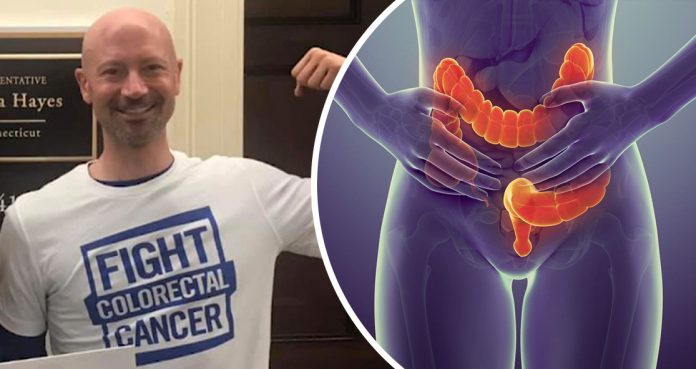The motive behind screenings related to cancer awareness is to save lives by making people know about what is going on.
March is a Colorectal Cancer Awareness Month. So, here’s another reminder to check with various concepts related to it.
Here’s a story of Michael Mancini who is a resident of Wolcott, New Haven County. Although being a fitness enthusiast, he contracted the disease.
He said, “I was super fit and healthy. I worked out religiously, I even taught a group fitness class. I was at work one day, having lunch, and all of a sudden had severe abdominal cramping.”
Earlier the doctors assumed he was getting constipation. But, they were wrong and he had to see a gastroenterologist.
The 42-year-old Mancini said, “The next day, I went in for an emergency colonoscopy. They didn’t get very far. They hit the tumor.”
Just three days later, he underwent the surgery for getting the tumor removed. He had stage 4 colon cancer and it was a malignant tumor. Consequently, he required 12 rounds of aggressive chemotherapy. One more tumor was removed last year from his liver.
Mancini said, “There’s 30 million people – over 30 million people – in this country between the ages of 50-75 who are eligible to get screened but just haven’t gone.”
Dr. Jeremy Kortmansky, co-director of the Gastro-Intestinal Cancers program at Yale, New Haven and Smilow Cancer Hospitals said, “That the rate of colon cancer is going down and the survival in colon cancer is improving, and we think a lot of that is due to colonoscopies.”
According to doctors, there is no better way to find colorectal cancers compared to colonoscopy. Dr. Kortmansky said in an interview, “The gastroenterologists, who are the ones who do the procedures take good care. They’ve made them a little bit less onerous, but the procedure itself is pretty straightforward.”
Michael Mancini says, “People don’t want to talk about it. It’s a little embarrassing. So we have to kind of get past that stigma and feel a little bit more comfortable talking about the topic because it’s really important that people get their screening.”
Mancini works for an insurance company and he is insured. But many people do not have insurance in spite of having serious health problems. His mission is to try for government funding for such people.
In an attempt to take his story to Washington, he got a congressional representative to support $70 million for the CDC’s colorectal cancer program. He said, “To provide opportunities for people in rural or lower income communities to get access to screenings, so we’re trying to fight for more of that type of funding.”
The symptoms of colorectal cancer include:
- change in bowel habits, such as diarrhea, constipation
- rectal bleeding
- dark stools, or blood in stools
- cramping or abdominal pain
- weakness and fatigue
- unintended weight loss
“A healthy diet, high in fruits and vegetables, low in fat, low in red meat, is very important,” said the co-director, Dr. Kortmansky.
The exercise expert, Mancini, has spread the word using hashtag #StrongArmSelfie by saying, “Because I was so healthy and fit, that definitely helped save my life. I would not have been able to endure that aggressive chemotherapy had I not been so healthy and fit going into it.”
Fitness is really something which helps Mancini stay healthy and strong.





















